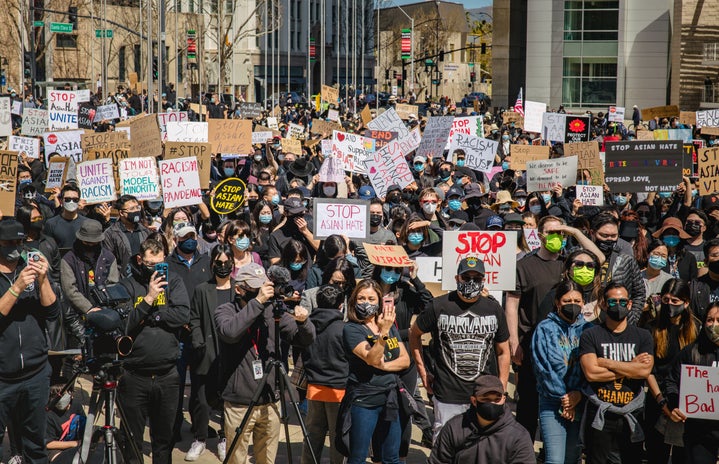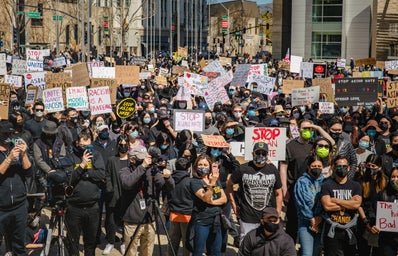I identify as East Asian. I grew up in an area full of other Asian people. My high school was 70% Asian and had an overall student body that was 93% POC. On top of that, I’ve never moved homes, therefore I never experienced living in an area with a smaller Asian population. Due to this, I never faced any significant racism or fetishization. However, not all other Asian women have had the same luck.
By the end of my first year of college, I couldn’t help but notice the microaggressions (and macroaggressions) I’ve experienced. I met a girl during my first month of college who only wanted to be my friend because I’m Asian (that obviously didn’t last). I also had a roommate who was obsessed with the K-pop band BTS and I, unfortunately, didn’t notice she was fetishizing me too until way after I moved out (when she reached out to me to be roommates, she probably thought she was going to get a k-pop idol). While on my Journeys trip to France, I faced several microaggressions. My classmates and I were walking down the streets of Marseille and we happened to pass by a guy. I heard him say “Bonjour” to all my classmates but when he got to me he said, “Ni Hao”. I remember talking to a French high school girl and she said, “Are you Korean? I love Koreans! I want to marry a Korean man.” I asked her if she knew BTS, and she replied she did. Then she says she loves the member Jungkook and calls him her husband. I then joked that Jungkook is my cousin and she got super wide-eyed, but I let her know it was a joke. Lastly, I had a music professor who asked me where I was from and I told her I’m from California. She replied, “Oh! You’re American!”. She then turns to my classmate who is also East Asian and asks them where they’re from. They tell her they’re from New York. Our professor says, “Oh! You’re also American! I was going to give you guys a song in Chinese.” My classmate isn’t Chinese and neither of us knows or is studying the language.
Due to not experiencing many racially motivated microaggressions, I had a difficult time noticing them when they occurred.
When I committed to Agnes Scott, it was right after the Atlanta spa shootings which was a very risky decision at the time. Out of the eight victims, six of which were Asian women. Experts and campaigners claim that the fact that six of the eight victims were Asian women is no accident. They claim the suspect’s comments are steeped in a history of misogyny and stereotypes that Asian and Asian American women are all too familiar with. We’ve been sexualized and fetishized. We’re regarded as submissive and docile. Furthermore, we frequently work in the service sector and are vulnerable to the same bigotry that Asian Americans face in general. It has been centuries since Asian and Asian American women were viewed as submissive, hypersexual, and exotic. The Page Act of 1875 is one of the oldest examples. This regulation, which was passed a few years before the Chinese Exclusion Act, appeared to limit prostitution and forced labor. In truth, it was utilized to prevent Chinese women from immigrating to the United States under the guise of being prostitutes. While serving in the US military abroad (including the Philippine-American War, World War II, and the Vietnam War), American service members have a history of soliciting sex workers and patronizing enterprises that support sex trafficking. This contributed to the perpetuation of stereotypical depictions of Asian women as sexual deviants, which were immortalized on screen.
The fetishization of Asian women has also affected them economically. These misconceptions contribute to the idea of “Asian women as disposable employees.” According to a January report from the National Women’s Law Center, Asian women made up the largest number of long-term unemployed employees in December. In addition, many Asian American women work in service industries like beauty salons, hotels, and restaurants. “The narrative gets lost because we’re seen as the ‘model minority,’ where they think we’re all lawyers, doctors, and engineers,” Choimorrow, of the National Asian Pacific American Women’s Forum, said. “But look a little deeper and many of the women in our community work in frontline service-based sectors.”
According to Esther Kao, an activist with Red Canary Song, a New York-based collective of Asian and Asian American advocates for massage parlors and sex workers, massage parlors and sex workers are particularly vulnerable.
She claims that these workers are not just stigmatized, but are also frequently migrants. Some people may be afraid of being deported if police investigate violence or crimes against them. It’s also worth noting that not all massage parlors offer sexual services, according to Kao. It’s a “racist assumption” to suggest as much, as the suspect in the Atlanta area assaults did, she added.
Since the commencement of the coronavirus pandemic, Asian Americans have seen an increase in incidences of hate and violence, mirroring a historical trend in which Asian Americans have been targeted during times of crisis because they are perceived as foreigners. Women are disproportionately harmed, according to organizations that track violence and harassment against Asian Americans and Pacific Islanders. Between March 19 of last year and February 28 of this year, nearly 3,800 hate incidents were reported to Stop AAPI Hate. According to the survey, women were targeted in a disproportionate share of those occurrences, accounting for 68 percent of reports compared to 29 percent for men.
On Twitter, Melissa Borja, an assistant professor of Asian/Pacific Islander American studies at the University of Michigan, highlighted that she and another group of researchers had noticed a similar pattern. Despite these findings, Borja believes that the extent to which Asian and Asian American women are victimized by racism and violence often goes unrecognized. “When we talk about crimes against Asian Americans, we become invisible,” she remarked. “It’s past time for us to have a complete discussion about our unique experiences and problems, especially in light of how society views us through this racist, gender prism.” Choimorrow and others believe that addressing this issue requires a comprehensive strategy that recognizes the vulnerabilities that Asian and Asian American women face.
However recently, it’s not just Asian women who can face fetishization.
“The best type of Asian is Korean.”
“I need to date a Korean man!”
“I wish I was a Korean girl so that my idol would accept me.”
At first glance, comments like these may appear appealing or respectful to Korean culture, but the truth is that they are rooted in fetishization. These statements rob Korean men of their identity. People of diverse forms, sizes, and colors make up every race, nationality, and ethnicity. Korean men are no exception because saying things like “All Korean guys are so cute!” groups them all into some sort of clichéd, perverted beauty ideal. The problem is, that not every Korean man resembles a K-idol. Just how not all American males look like Brad Pitt, for example. Basing perceptions of Korean men’s attractiveness on a few idols creates a black-and-white picture of male beauty that ignores the diversity that they actually possess.
Korean culture has blossomed in numerous industries as a result of K-pop becoming a global phenomenon thanks to the fame of several Korean singers such as Psy and BTS. With its spectacular choreographies, gorgeous idols, and harmony of many genres, K-pop enthralled the world. K-pop essentially hit a fever pitch with the growth of BTS’ fame in 2017, allowing South Korean culture to sweep the world by storm. K-pop has helped the world gain stronger respect for South Korean culture by increasing Korean consumption and tourism, but it has also caused individuals to be overly influenced by it.
As a result of this increased passion, a new name — “Koreaboo” or “Kboo” — has evolved to describe someone who is enamored with Korean culture. There are a variety of ways “Kboos” romanticize the culture, ranging from opting to pursue a “glamorous” career as a K-pop idol to culturally identifying as Korean and having internalized racism toward their own cultures. Those who continue to love and admire specific aspects of Korean culture, from mannerisms to music, must be conscious of the unfairness that exists not only within the K-pop business but also throughout Korean society.
A person who respects Korean culture has a moral duty to speak out against Asian hate. It should go beyond personal enjoyment, especially if at any point within the last year, you enjoyed “Parasite,” “Minari,” invested in a Korean beauty regime, watched Korean game streams, or sang along to “Dynamite”. A dangerous habit is liking something only when it is convenient for you.
Ultimately, it’s all about intention. The point isn’t to shame anyone into living inside a box. Any person can understand why a lot of normalized behaviors are harmful. If you slip up, then simply listen, acknowledge, and do better next time. If your heart is in the right place, you will always learn and grow.


